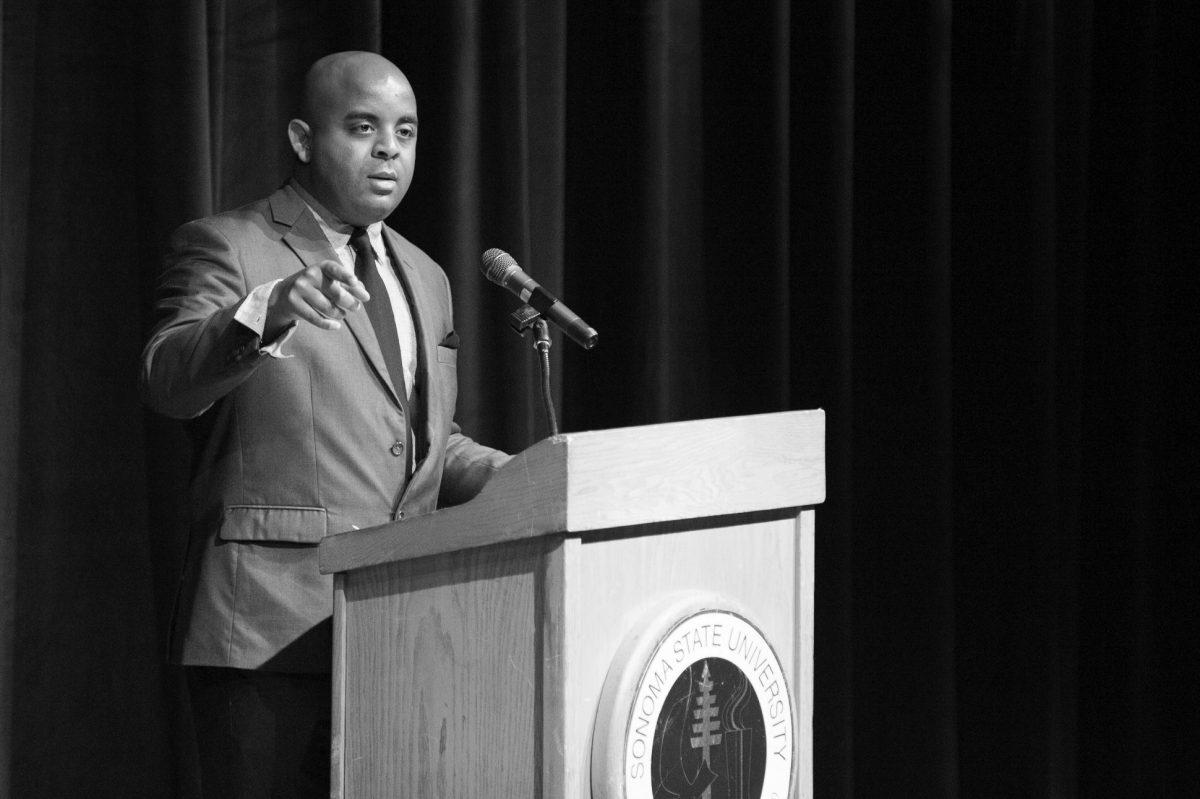With the conclusion of Black History Month, Wednesday’s “Evening with Reverend Jarrett Maupin,” put on by Associated Student Productions (ASP), raised the issues of racism and inequality here on campus, amongst other schools that operate similarly to Sonoma State.
Maupin referred quite frequently to the recent “MLK Black Party” scandal that took place at Arizona State University.
As a Phoenix civil rights activist he speaks to communities about the controversy over this event and issues around alleged racism in the American school system. ASU administration banned the Tau Kappa Epsilon as a fraternity just few weeks after MLK’s birthday. Soon after photos were released to the public, Maupin held a press conference on the ASU campus, calling for expulsion of all students involved. Since then, he has retracted that goal and sought for equality.
“Recognize that the world is changing, imperialism, colonialism is all dead, baby. And it impacts you on every level, down to the school you’re attending,” said Maupin.
With the fraternity scandal that took place at ASU, many wondered if the effects would reach the SSU campus. Within a sense, it has, bringing the attention of speakers such as Maupin to speak up and change old world values in the educational system. The central goal and position of his speech here on campus was focusing on the breakdown of ignorance that arises on college campuses and within communities.
“If black scholar colleges can triple the rate of white minorities within their schools, Sonoma State can triple its black minority. Shame on SSU for remaining ignorant about the implementation of diversity procedures within the educational system. You’re not just a member of this school, or this community but you have a worldly duty,” said Rev. Maupin.
Roughly two to three percent of all students attending SSU are black. That’s about 200 students of the total approximate 10,000 student population. This is compared to the majority 63 percent of white students.
“Why are there no blacks here? Because someone doesn’t want them here. The president of this school is nothing more than a Cuban man, living in a white privileged community, making the wrong decisions for the diversity your school,” said Maupin.
Maupin continued with hopeful enthusiasm. “The University’s responsibility is to respect the students. How long does the list of indictments need to be? Quality education is built on the basis of equality,” said Maupin. “Within myself, within all of you there is a freedom fighter that is willing to do good and make a difference, it all starts with the process of education. And if you can’t change yourself, then what can you change?”
In the 2013 Black History Month last year at SSU, discriminating acts took place after a Black Scholars United community event on campus where posters were found with offensive and racist material slandering the black community. When news of the offensive material spread like wildfire through social media, Sonoma State reacted quickly and held a community forum to discuss the nature of the occurrence.
Since the incident, there have been many multicultural and diversity lectures given on the SSU campus to extinguish the ignorance behind the curtain.
“Never too old, never to young, the ability to do the right thing is always in the palm of your hands,” said Maupin.
The ASU administration was successfully able to handle the backlash arising from the insensitive acts brought on by a small percentage of its students. And though Sonoma State has proven to be lacking within its diversity, learning from past mistakes and those that occur at similar schools was the extensive message Maupin was trying to communicate in his lecture.
The recognition of changing ignorance through the tool of education was the complete message that was reiterated many times during his speech.
“We need bold audacious actions, so speak up whether you’re the minority or the majority fighting for the right of diversity within your school. If this is your university, do something about it. I’m not encouraging rebellion, I’m just encouraging fairness,” said Maupin.



































